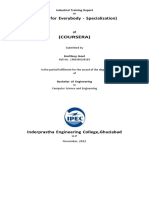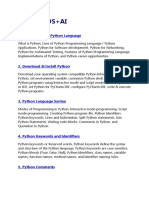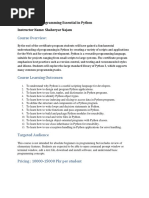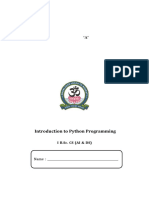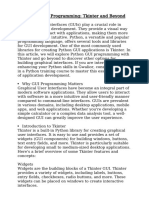0 ratings0% found this document useful (0 votes)
34 viewsDSA in Python
Uploaded by
codewithtushpatCopyright
© © All Rights Reserved
We take content rights seriously. If you suspect this is your content, claim it here.
Available Formats
Download as DOCX, PDF, TXT or read online on Scribd
0 ratings0% found this document useful (0 votes)
34 viewsDSA in Python
Uploaded by
codewithtushpatCopyright
© © All Rights Reserved
We take content rights seriously. If you suspect this is your content, claim it here.
Available Formats
Download as DOCX, PDF, TXT or read online on Scribd
You are on page 1/ 6
Data Structures and Algorithms in Python
A Key to Success with Python Training
Introduction
In today's fast-paced digital world, the importance of data
cannot be overstated. From multinational corporations to
small startups, everyone relies on data to make informed
decisions, streamline operations, and gain a competitive
edge. Python, a versatile and powerful programming
language, has become the go-to choice for data
manipulation, analysis, and visualization. To harness the
full potential of Python, it is crucial to understand the core
concepts of data structures and algorithms. In this article,
we will delve into the world of data structures and
algorithms in Python, emphasizing their importance and
their role in the Python training course provider in Indore.
The Significance of Python in the Digital Era
Python has garnered immense popularity in recent years,
and for good reason. Its simplicity, readability, and vast
libraries make it a favorite among developers, data
scientists, and machine learning engineers. Python's appeal
lies not only in its ease of use but also in its powerful
capabilities. Whether you are working with data,
developing web applications, or diving into machine
learning, Python offers a robust and adaptable platform to
meet your needs.
One of the driving forces behind Python's success is its
extensive ecosystem of libraries and frameworks. The
Python Package Index (PyPI) boasts thousands of packages
that cater to various domains. Libraries like NumPy,
pandas, and Matplotlib have revolutionized data
manipulation and visualization, making Python an
indispensable tool for data professionals.
Data structures are fundamental constructs used to
organize and store data efficiently. They serve as the
foundation upon which algorithms operate. In Python,
several built-in data structures are readily available, each
with its own strengths and weaknesses.
1. Lists: Lists are one of the most versatile and commonly
used data structures in Python. They are ordered
collections of items, allowing for easy indexing, slicing, and
modification. Lists can hold a mix of data types, making
them suitable for a wide range of applications.
2. Tuples: Tuples are similar to lists but with one crucial
difference—they are immutable. Once created, a tuple
cannot be altered. This immutability makes them ideal for
storing data that should not be changed during program
execution.
3. Dictionaries: Dictionaries are key-value pairs that enable
efficient retrieval of values based on unique keys. They are
useful for implementing data structures like hash maps and
are commonly used in scenarios where quick access to data
is essential.
4. Sets: Sets are collections of unique elements. They are
valuable when dealing with situations where duplicate
values should be eliminated, or when performing set
operations like union, intersection, and difference.
5. Arrays: Arrays in Python are provided by the NumPy
library. Unlike lists, NumPy arrays are homogeneous,
meaning they contain elements of the same data type. This
homogeneity enables efficient mathematical and statistical
operations.
6. Linked Lists: Although not a built-in data structure,
linked lists are essential for understanding advanced data
structures and algorithms. Linked lists consist of nodes,
each pointing to the next node in the sequence. They are
efficient for insertions and deletions but require extra
memory for pointers.
Python's built-in data structures are powerful tools for
managing data, but to fully leverage Python's capabilities,
one must also master algorithms.
The Role of Algorithms in Python
Algorithms are step-by-step procedures or sets of rules
used to solve specific problems or perform tasks. They are
the driving force behind software applications and are
essential for efficient data processing. Understanding and
implementing algorithms is crucial for writing efficient and
scalable Python code.
Python provides a vast library of algorithms for various
purposes. Some notable ones include:
1. Sorting Algorithms: Sorting is a fundamental operation
in computer science. Python offers built-in sorting methods
like `sorted()` and `list.sort()`, which use the Timsort
algorithm under the hood. Understanding the principles of
sorting algorithms, such as Quick Sort and Merge Sort, can
help in optimizing sorting tasks for specific scenarios.
2. Searching Algorithms: Python's built-in `in` operator
can be used for simple searches, but more complex search
operations require knowledge of algorithms like Binary
Search and Linear Search. These algorithms are crucial for
efficiently finding elements in large datasets.
3. Graph Algorithms: Graph algorithms, such as Dijkstra's
algorithm for shortest path finding and breadth-first search
(BFS) for graph traversal, are vital in various domains,
including social networks, transportation, and
recommendation systems.
4. Dynamic Programming: Dynamic programming is a
problem-solving technique that breaks down complex
problems into simpler subproblems and stores their
solutions to avoid redundant calculations. Python's
versatility makes it an excellent choice for implementing
dynamic programming algorithms.
5. Recursion: Recursion is a programming technique where
a function calls itself to solve a problem. Python is
particularly well-suited for recursive algorithms due to its
elegant syntax and support for recursion depth.
Crucial Role of Python Training Course
Now that we understand the importance of data structures
and algorithms in Python, let's explore how they play a
crucial role in the Python training course provider in
Indore. Indore, a bustling city in the Indian state of Madhya
Pradesh, has seen rapid growth in the IT sector. As a
result, there is a high demand for Python training courses
to equip aspiring professionals with the skills needed to
excel in the industry.
Python training institutes in Indore recognize the
significance of data structures and algorithms in preparing
students for real-world challenges. These institutes offer
comprehensive Python courses that cover not only the
basics of the language but also delve deep into data
structures and algorithms. Here's how data structures and
algorithms contribute to the success of Python training in
Indore:
1. Enhanced Problem-Solving Skills: Learning data
structures and algorithms in Python equips students with
problem-solving skills that are highly valued in the IT
industry. They can tackle complex programming challenges
with confidence, a skill that sets them apart in the job
market.
2. Efficient Code Development: Indore, along with other
tech hubs like Bangalore and Hyderabad, is home to
numerous IT companies. These companies require
developers who can write efficient and optimized code.
Python training courses in Indore focus on teaching
students how to select the right data structure and
algorithm for the job, resulting in code that performs well.
3. Interview Preparation: Many Python training courses in
Indore also offer interview preparation for job seekers. A
significant portion of technical interviews for software
development roles includes questions related to data
structures and algorithms. Being well-versed in these
topics increases a candidate's chances of landing a job.
4. Project-Based Learning: Python training institutes in
Indore often emphasize project-based learning. Students
work on real-world projects that involve data manipulation,
analysis, and visualization. Knowledge of data structures
and algorithms is crucial for designing efficient solutions to
project challenges.
5. Competitive Advantage: With the proliferation of Python
in data science and machine learning, understanding data
structures and algorithms is not limited to software
development roles. Data scientists and machine learning
engineers in cities like Indore need these skills to build
robust models and algorithms.
Python Training in Other Indian Cities
While Indore thrives as a technology hub in Madhya
Pradesh, other Indian cities are also experiencing a surge
in demand for Python training. Let's take a brief look at
how data structures and algorithms play a role in Python
training in three different cities: Mumbai, Pune, and
Chennai.
1. Mumbai: As the financial capital of India, Mumbai has a
burgeoning IT sector. Python training courses in Mumbai
cater to a diverse audience, including finance
professionals, data analysts, and software developers.
Knowledge of data structures and algorithms is
particularly valuable for financial analysts who need to
process large datasets efficiently.
2. Pune: Pune, often referred to as the "Oxford of the East"
due to its numerous educational institutions, is a hotspot
for Python training. Students and professionals in Pune
benefit from Python courses that emphasize algorithmic
thinking and data structure implementation, ensuring they
are well-prepared for the job market.
3. Chennai: Chennai, a major IT hub in South India, offers
a wide range of Python training programs. The city's
Python training institutes recognize the importance of
algorithms and data structures, as they form the foundation
for developing software solutions in various domains,
including healthcare, logistics, and e-commerce.
Conclusion
In today's data-driven world, Python stands out as a
powerful and versatile programming language. To fully
harness its capabilities, it is essential to understand the
core concepts of data structures and algorithms. Whether
you are a student aspiring to excel in the IT industry or a
professional seeking to enhance your skills, Python training
courses in cities like Indore, Mumbai, Pune, and Chennai
offer a pathway to success.
Data structures and algorithms are not just theoretical
concepts; they are the building blocks of efficient and
optimized code. In the competitive job market, individuals
with a strong foundation in these areas stand out as
valuable assets to their employers. So, if you're considering
a Python training course in Indore or any other Indian city,
make sure it includes a robust curriculum that covers data
structures and algorithms thoroughly. This knowledge will
be your key to unlocking a world of opportunities in the
ever-evolving field of technology.
You might also like
- Java Spring Boot Enterprise Application DevelopmentNo ratings yetJava Spring Boot Enterprise Application Development4 pages
- Data Structures and Algorithms in Python by Michael T. Goodrich, Roberto Tamassia, Michael H. GoldwasserNo ratings yetData Structures and Algorithms in Python by Michael T. Goodrich, Roberto Tamassia, Michael H. Goldwasser770 pages
- Python Programming for Beginners: A Comprehensive Crash Course With Practical Exercises to Quickly Learn Coding and Programming for Data Analysis and Machine LearningFrom EverandPython Programming for Beginners: A Comprehensive Crash Course With Practical Exercises to Quickly Learn Coding and Programming for Data Analysis and Machine Learning4.5/5 (6)
- Algorithmic Excellence Choosing The Right Algorithms For Python OptimizationNo ratings yetAlgorithmic Excellence Choosing The Right Algorithms For Python Optimization4 pages
- Ashford D. Python for Algorithms and Data Structures 2024No ratings yetAshford D. Python for Algorithms and Data Structures 2024475 pages
- Learn Python: Get Started Now with Our Beginner’s Guide to Coding, Programming, and Understanding Artificial Intelligence in the Fastest-Growing Machine Learning LanguageFrom EverandLearn Python: Get Started Now with Our Beginner’s Guide to Coding, Programming, and Understanding Artificial Intelligence in the Fastest-Growing Machine Learning Language5/5 (3)
- IIT-M Advanced Programming Professional & Master Data ScienceNo ratings yetIIT-M Advanced Programming Professional & Master Data Science20 pages
- IoT Data Analytics using Python: Learn how to use Python to collect, analyze, and visualize IoT data (English Edition)From EverandIoT Data Analytics using Python: Learn how to use Python to collect, analyze, and visualize IoT data (English Edition)No ratings yet
- Python for AI: Applying Machine Learning in Everyday ProjectsFrom EverandPython for AI: Applying Machine Learning in Everyday ProjectsNo ratings yet
- Data Driven Guide for Python Programming : Master Essentials to Advanced Data StructuresFrom EverandData Driven Guide for Python Programming : Master Essentials to Advanced Data StructuresNo ratings yet
- Financial Data Science with Python: An Integrated Approach to Analysis, Modeling, and Machine LearningFrom EverandFinancial Data Science with Python: An Integrated Approach to Analysis, Modeling, and Machine LearningNo ratings yet
- Python Performance Engineering: Strategies and Patterns for Optimized CodeFrom EverandPython Performance Engineering: Strategies and Patterns for Optimized CodeNo ratings yet
- python 6 month _data analyst course (3)No ratings yetpython 6 month _data analyst course (3)20 pages
- Course Overview:: Course Name: Programming Essential in Python Instructor Name: Shaheryar NajamNo ratings yetCourse Overview:: Course Name: Programming Essential in Python Instructor Name: Shaheryar Najam3 pages
- Python Programming For Beginners: Python Programming Language TutorialFrom EverandPython Programming For Beginners: Python Programming Language TutorialNo ratings yet
- PYTHON DATA ANALYTICS: Mastering Python for Effective Data Analysis and Visualization (2024 Beginner Guide)From EverandPYTHON DATA ANALYTICS: Mastering Python for Effective Data Analysis and Visualization (2024 Beginner Guide)No ratings yet
- Hands-on Data Analysis and Visualization with Pandas: Engineer, Analyse and Visualize Data, Using Powerful Python LibrariesFrom EverandHands-on Data Analysis and Visualization with Pandas: Engineer, Analyse and Visualize Data, Using Powerful Python Libraries5/5 (1)
- Online Python Training Institute in HyderabadNo ratings yetOnline Python Training Institute in Hyderabad3 pages
- Mastering the Craft of Python Programming: Unraveling the Secrets of Expert-Level ProgrammingFrom EverandMastering the Craft of Python Programming: Unraveling the Secrets of Expert-Level ProgrammingNo ratings yet
- Basic of Python (ARTIFICIAL INTELLIGENCE)No ratings yetBasic of Python (ARTIFICIAL INTELLIGENCE)6 pages
- Unleashing The Data Revolution NLP's Dynamic Impact On Data ScienceNo ratings yetUnleashing The Data Revolution NLP's Dynamic Impact On Data Science3 pages
- From Novice To Full-Stack Pro Navigating Your Development JourneyNo ratings yetFrom Novice To Full-Stack Pro Navigating Your Development Journey5 pages
- Unlock Insights With AB Testing Data-Driven Decision MakingNo ratings yetUnlock Insights With AB Testing Data-Driven Decision Making5 pages
- Precision Unleashed Mastering Data Quality For Unrivaled Analytics ExcellenceNo ratings yetPrecision Unleashed Mastering Data Quality For Unrivaled Analytics Excellence3 pages
- Tech Odyssey Unlocking Opportunities For Full Stack Wizards in The Heart of Lucknow's Digital RevolutionNo ratings yetTech Odyssey Unlocking Opportunities For Full Stack Wizards in The Heart of Lucknow's Digital Revolution3 pages
- Python GUI Programming Tkinter and BeyondNo ratings yetPython GUI Programming Tkinter and Beyond6 pages
- Python Mastery Unleashed Transform Your Tech Journey With Gurgaon's Premier Training Hub!No ratings yetPython Mastery Unleashed Transform Your Tech Journey With Gurgaon's Premier Training Hub!4 pages
- Python and Competitive Programming Mastering Coding Challenges in NagpurNo ratings yetPython and Competitive Programming Mastering Coding Challenges in Nagpur4 pages
- Understand Inheritance and Polymorphism in JavaNo ratings yetUnderstand Inheritance and Polymorphism in Java4 pages
- Unleashing The Power of Java in Database DomainsNo ratings yetUnleashing The Power of Java in Database Domains4 pages
- Smart Strategies For Successful Data Analytics ImplementationNo ratings yetSmart Strategies For Successful Data Analytics Implementation3 pages
- Optimizing Database Queries For Full-Stack PerformanceNo ratings yetOptimizing Database Queries For Full-Stack Performance4 pages
- JavaFX Building Rich User Interfaces With JavaNo ratings yetJavaFX Building Rich User Interfaces With Java3 pages
- Empowering Your Development Journey Choosing The Right Full Stack Framework StackNo ratings yetEmpowering Your Development Journey Choosing The Right Full Stack Framework Stack6 pages
- Deep Learning With Python and TensorFlow KerasNo ratings yetDeep Learning With Python and TensorFlow Keras4 pages
- Full Stack Development Trends What's On The HorizonNo ratings yetFull Stack Development Trends What's On The Horizon4 pages
- Python and Competitive Programming Mastering Coding Challenges in NagpurNo ratings yetPython and Competitive Programming Mastering Coding Challenges in Nagpur5 pages
- Explaining The V-Model A Structured Approach To Software TestingNo ratings yetExplaining The V-Model A Structured Approach To Software Testing4 pages
- Deep Learning For Predictive Data Analytics A Path To ExcellenceNo ratings yetDeep Learning For Predictive Data Analytics A Path To Excellence5 pages
- Data Science vs. Data Analytics Understanding The DifferencesNo ratings yetData Science vs. Data Analytics Understanding The Differences5 pages
- Data Analytics Tools A Comprehensive OverviewNo ratings yetData Analytics Tools A Comprehensive Overview6 pages
- Exploratory Testing in Agile Uncovering Hidden BugsNo ratings yetExploratory Testing in Agile Uncovering Hidden Bugs5 pages
- Blockchain and Data Science Ensuring Data Integrity and SecurityNo ratings yetBlockchain and Data Science Ensuring Data Integrity and Security5 pages
- Co 3 Sem 17330 Data Structure Using Cwinter 2018No ratings yetCo 3 Sem 17330 Data Structure Using Cwinter 20183 pages
- Important C Questions For Written Test & Interview by Crack The Interview100% (8)Important C Questions For Written Test & Interview by Crack The Interview236 pages
- Data Structures and Algorithms in C 4th Edition Adam Drozdek download100% (2)Data Structures and Algorithms in C 4th Edition Adam Drozdek download83 pages
- ELC Full Stack Web Development CurriculumNo ratings yetELC Full Stack Web Development Curriculum18 pages
- Kathir College of Engineering, Neelambur Lesson PlanNo ratings yetKathir College of Engineering, Neelambur Lesson Plan15 pages
- Bachelor of Technology: Rtificial Ntelligence AND Achine EarningNo ratings yetBachelor of Technology: Rtificial Ntelligence AND Achine Earning117 pages
- 50 Muliple Choice Questions of Object Oriented ProgrammingNo ratings yet50 Muliple Choice Questions of Object Oriented Programming7 pages
- University of Kerala: Syllabus For Iii Semester Computer Science & EngineeringNo ratings yetUniversity of Kerala: Syllabus For Iii Semester Computer Science & Engineering21 pages
- III IV ISE Scheme and Syllabus 2016 2017 1No ratings yetIII IV ISE Scheme and Syllabus 2016 2017 143 pages









